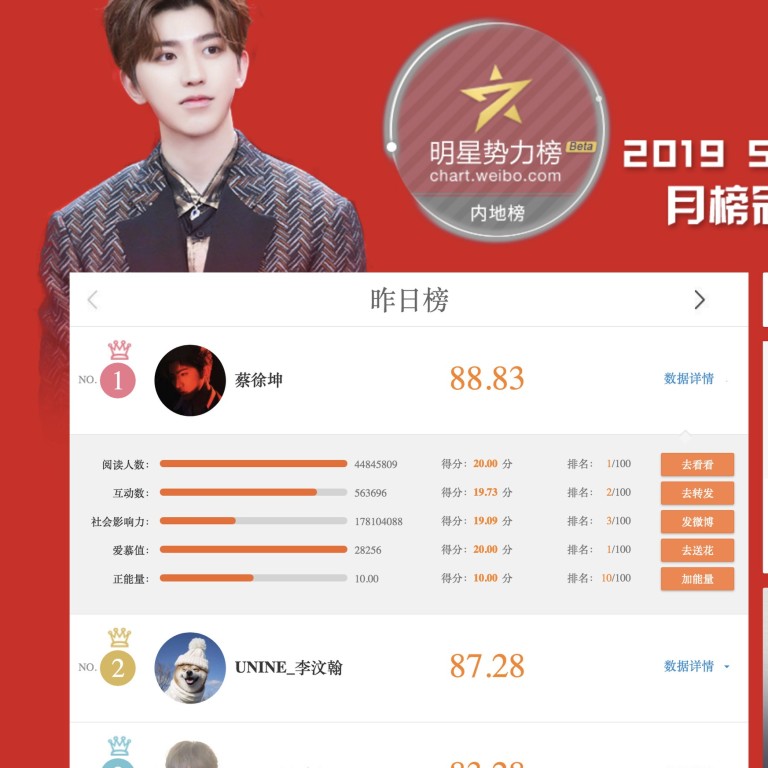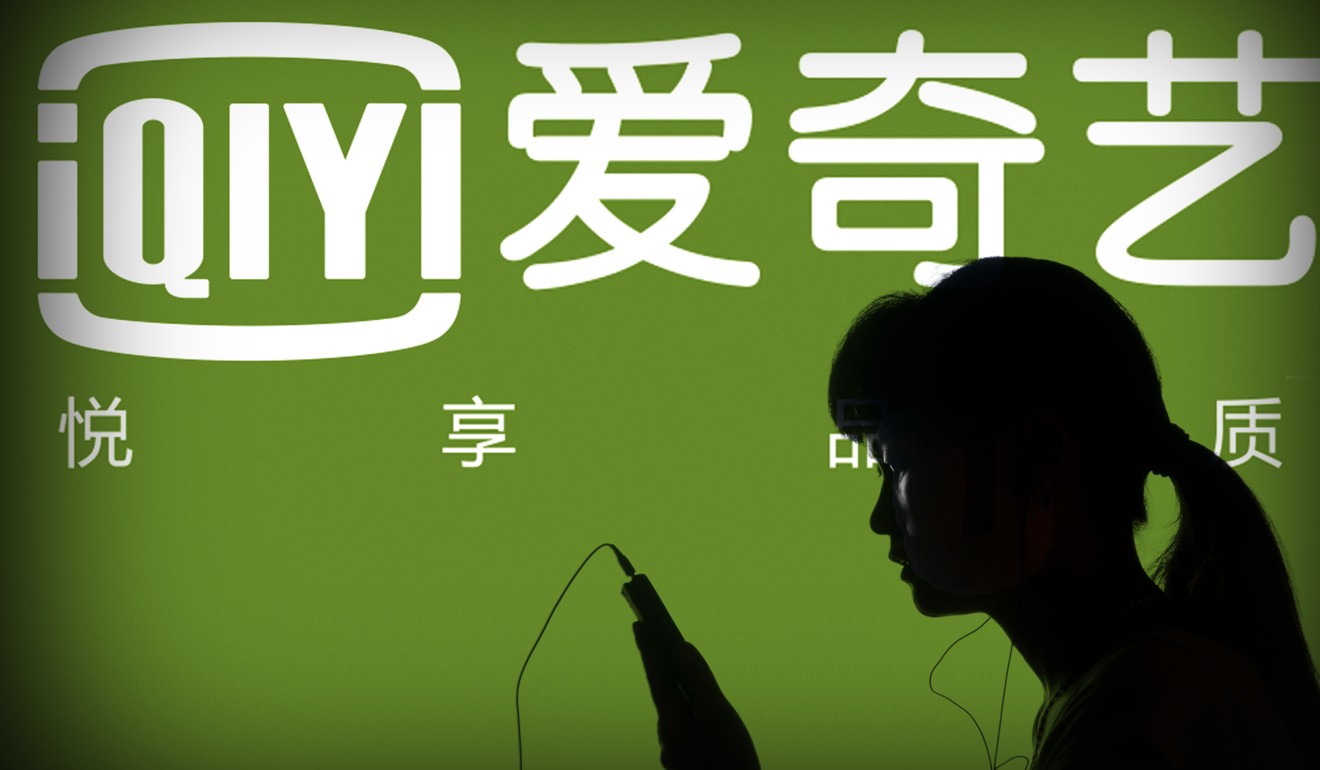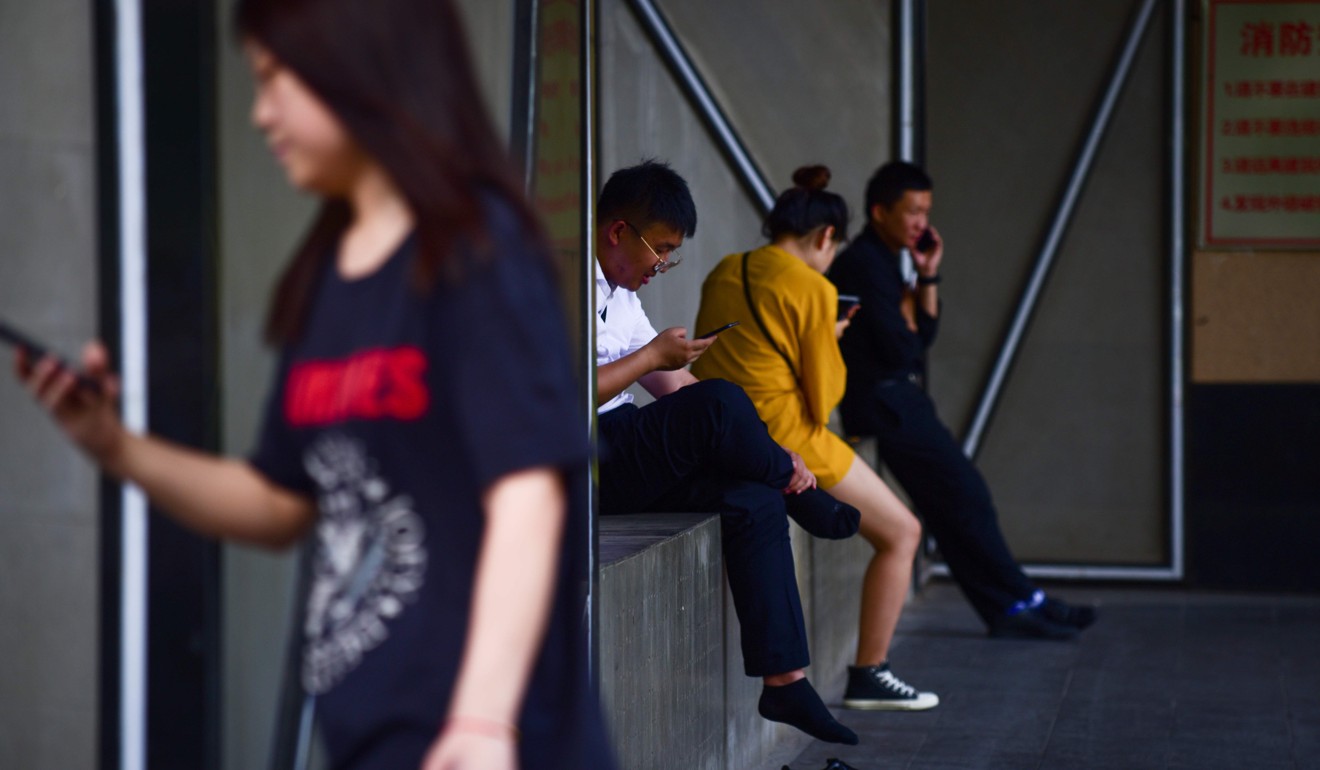
Loyal fans of Chinese celebrities left out of pocket by fake online traffic campaigns on Xinyuan app
- Legions of fanatics were using the app – now shut down by police – which sold memberships to increase shares and comments for pop idol
Lyn is paying the price for being a loyal fan of Cai Xukun. A year after she began to idolise the young Chinese pop star, she is thousands of yuan poorer. But not from buying Cai’s fan merchandise; from helping him inflate his social media numbers.
Lyn, who asked that her full name not be used, and others like her are said to have been exploited by an app that sold memberships to increase traffic for Cai.
Authorities in China reportedly have shut down the app, Xinyuan, in a crackdown on celebrities’ falsely inflated social media numbers, boosted by hard core supporters who are now out of pocket thanks to their own largesse.
Cai rose to fame through his performances on Idol Producer, a popular talent show streamed on China’s Netflix, iQiyi.

In August, Cai’s promotional post on Twitter-like site Weibo of the music video for his new song, Pull Up, raised eyebrows when it garnered over 100 million shares – 20 times more than the most-retweeted tweet – within 10 days.
The sky-high numbers aroused Beijing’s suspicion. In a Weibo article that month, the Communist Youth League run by the Communist Party of China, questioned the legitimacy of Cai’s popularity.
“Typically the share count is lower than like count, and very few bloggers can achieve tens of millions of shares,” the youth league noted in the article.
Police found that Cai’s fans had banded together to pay for services that inflated the Pull Up numbers as a 20th birthday “gift” for the singer.
Big social media numbers translate into lucrative sponsorship deals as advertisers gauge a celebrity’s commercial value partly on the basis of his or her social media buzz.
“The number of shares and comments shows how influential the idol is on social media,” Lyn said.
Once the idol became an official for a company or product, fans would be urged to maintain the buzz, to prove the advertiser had made “the right decision”, Lyn said.
Last week Beijing police shut down Xinyuan, the app that had been used to inflate the numbers, The Beijing News reported.
Users who paid to become members of the service – its name translates to “star support” – got to share posts repetitively with thousands of Weibo accounts.
Members can attach thousands of Weibo accounts to their original accounts, enabling them to share posts repetitively, with just one click.

These attached accounts are known as “fake accounts” because of rules that permit only one Weibo account to be opened under a real name.
In March, police arrested four operators of the app on suspicion of putting computer information systems into jeopardy, The Beijing News reported. The app had earned 8 million yuan (US$1.7 million) within six months, it was reported.
Diehard fans who had invested heavily in the app are complaining about losing their money.
“What about the thousands of accounts I have attached through the app?” a Weibo user named Daning wrote.
Daning, who said she was a fan of another contestant on Idol Producer, said she had not been able to retrieve her money even though the service had been suspended since November.
Meanwhile, a number of new reality talent shows are trying to replicate Idol Producer’s success and its selecting of young idols through viewers’ votes.
Fans spend a colossal amount of money and time to help their idols win.
Competing fan bases’ push to acquire an edge for their idols complicates the effort to stop traffic data inflation.
Celeste, a 23-year-old fan of Yan Xujia, a contestant on Produce Camp, joined a fan club dedicated to voting for the singer on various online platforms, including Weibo.
Assigned 500 Weibo accounts, she spent about five hours a day in front of her computer, voting simply by switching accounts and clicking the mouse.
Fans got gifts in return, such as banners printed with the idol’s image and name, Celeste said. But she emphasised that her actions were strictly voluntary, stemming from her desire to create a bright future for her idol.
“I’ve never cared about the gifts,” she said.
The club raised over 4 million yuan (US$582,000) during the two-month show, mainly to buy the accounts for online voting, Celeste said.
Weibo has begun capping share and comment counts at 1 million to fight the epidemic of inflated traffic data. When the number of shares or comments exceeds one million, the number will be displayed only as “one million-plus”.
But fans say Weibo is partly to blame for the problem in the first place.
A list that Weibo launched and regularly updates ranks celebrities by popularity. Critics say the site’s policy of prominently featuring celebrities who top the list gives fans an incentive to boost the numbers.
Sina Corp, the Chinese technology company that owns Weibo, did not respond to requests for comment.
A number of platforms besides Weibo are moving to control the plague of fabricated data.
In September, iQiyi said it would replace its view count display with a composite index that indicated viewership. It attributed the move to the “negative effects” of competition and related illegal activity around view counts.
Four months later, Youku, another major video-streaming site in China, also began hiding its view counts.
But campaigns by competing fan bases to acquire an edge for their reality-show idols complicate the effort to stop traffic data inflation.
“We are forced to [do whatever it takes to help them],” Celeste said. “Because every time the ideal numbers of comments and shares are not achieved, fans of other contestants would say our idol doesn’t deserve his rank.”
‘Utopian socialists’: CrossFit deletes its Facebook and Instagram
Despite the Xinyuan app’s shutdown, numerous sellers of fake accounts remain active. But many now can be found only through word of mouth recommendations from friends.
A seller named Mr Weibo said a Weibo account could sell for 5 to 100 yuan, with accounts registered earlier fetching even more as they were less likely to be blocked.
“Early-registered accounts are just like collections,” the seller said. “They are more durable.”
But the fake accounts ultimately may be doing less to raise a pop star’s profile than some think.
Across China’s entertainment industry last year, 64 per cent of the data was deemed “ineffective”, up 3 per cent from 2017, according to Bai Yicong, a Chinese director and screenwriter who spoke in January at an event that published yearly data about Chinese celebrities.
Ineffective activities included “abnormal social media behaviour” such as repetitively sending posts with the same content within a certain time period, according to AlMan Data, the Beijing-based tech company which provided the data for the event.
For Cai, only 27 per cent was found to be “effective”, the event was told.
“Cai Xukun is popular, but not as popular as you’ve imagined,” Bai said.

